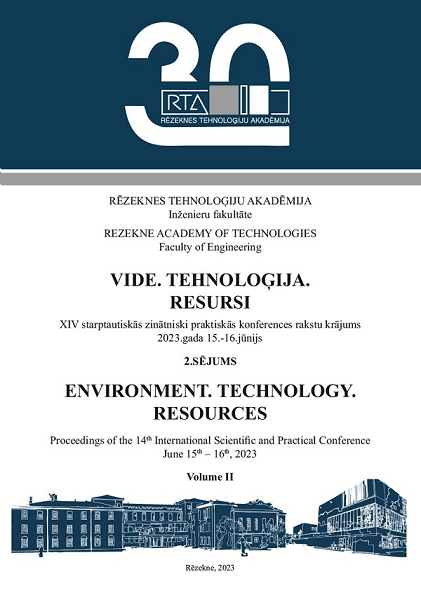LIFELONG LEARNING FOR TALENT MANAGEMENT AND PROFESSIONAL DEVELOPMENT OF EMPLOYEES
DOI:
https://doi.org/10.17770/etr2023vol2.7232Keywords:
inclusivity, DigComp, educationIT/ICTAbstract
The new challenges in almost all organisations are based on people. It is their competences, knowledge and skills that enable any organisation to grow. Personnel are a resource that must be properly taken care of. Effective talent management is mainly based on planning and building career paths. Talent management is one of the most important business priorities for organisations that care about achieving business goals, knowledge management and managing staff potential. Research shows that entities that identify and manage talent produce 15 per cent higher results for their stakeholders compared to pillars that do not run such programmes.
The aim of this article is to present the activities carried out within the framework of TALENT MANAGEMENT ERASMUS+ project nr 2021-2-ES01-KA210-ADU-000048687, which is dedicated to economically active employees over 45 years of age and promotes integration in the labour market.
Downloads
References
R. Morakanyane, P. O’Reilly, J. McAvoy. Determining digital transformation success factors. Proceedings of the 53rd Hawaii International Conference on System Sciences ar, Hawaii 2020.
G.C. Kane. Digital maturity, nor digital transformation. MIT Sloan Manag. Rev., 14, 26-31, 2017.
G. George, E. Osinga, D. Lavie, B. Scott. Big data and data science methods for management research. Acad. Manag. J., 59 (5), 1493-1507, 2016.
J. Berman. Digital transformation: opportunities to create new business models. Strateg. Leadersh., 40 (2), 16-24, 2016.
A. Beraha, D. Bingol, E. Ozkan-Canbolat, N. Szczygiel. The effect of strategic flexibility configurations on product innovation. Eur. J. Manag. Bus. Econ., 27 (2), 129-140, 2016.
A. Ancarani, C. Di Mauro. How does digitization affect the behaviour of purchasers and team members in related functions? Digitalisierung im Einkauf, Springer Gabler, Wiesbaden, 2018.
A. Teubner. Information systems strategy - theory, practice, and challenges for future research. Bus. Inf. Syst. Eng., 5 (4), 243-257, 2013.
C. Matt, T. Hess, A. Benlian. Digital Transformation Strategies. Business and Information Systems. Engineering Catchword, 57 (5), 339-343, 2015.
L. Downes, P.F. Nunes. Big-bang disruption. Harv. Bus. Rev., 91, 45-56, 2013.
P. Bican, A. Brem. Digital business model, digital transformation, digital entrepreneurship: is there a sustainable “Digital”? Sustainability, 12, 5239-5254, 2020.
ELENE. Elders learning English for Europe. 2023. Retrieved March 26, 2023, from https://inbie.pl/elene
DIGIN. Information about the project. 2023 Retrieved March 26, 2023, from https://inbie.pl/digin
TM. Talent Management.2023. Retrieved March 26, 2023, from https://inbie.pl/tm
S. Robbins. Comportamiento Organizacional. Pearson Educación, Barcelona, 2008.
C. Matt, T. Hess, A. Benlian. Digital Transformation Strategies. Business and Information Systems. Engineering Catchword, 57 (5), 339-343, 2015.
E. Michaels, H. Handfield-Jones, B. Axelrod. The War for Talent. Harvard Business School Press, Boston, MA, 2001.
S. Beechler, I.C. Woodward. The global “War for Talent”. J. Int. Manag., 15 (3), 273-285, 2009.
E. Gallardo-Gallardo, S. Nijs, N. Dries, P. Gallo. Towards an understanding of talent management as a phenomenon-driven field using bibliometric and content analysis. Hum. Resour. Manag. Rev., 25, 264-279, 2015.
Ingram T., Zarzadzanie talentami. Teoria dla praktyki zarzadzania zasobami ludzkimi, PWE, Warszawa 2011.
Eurostat. Statistics Explained. Statistics Explained. Retrieved February 10, 2023, from https://ec.europa.eu/eurostat/statistics-explained/index.php?title=Ageing_Europe_-_statistics_on_working_and_moving_into_retirement&oldid=581874
UK Commission for Employment and Skills (2014, February 28). The Future of Work: Jobs and Skills in 2030. GOV.UK. Retrieved February 10, 2023, from https://www.gov.uk/government/publications/jobs-and-skills-in-2030
OECD. Ageing and employment policies working better with age. 2019, http://t4.oecd.org/els/emp/Brochure%20OW%2028-08.pdf
J. L. Perry. Strategic human resource management. Review of Public Personnel Administration, 13(4), 59-71, 1993.
B. E.Becker, M. A. Huselid. Overview: Strategic human resource management in five leading firms. Human resource management, 38(4), 287-301, 1999.
Alonso & García-Muina,. La gestión del talento: Líneas de trabajo y procesos clave. Intangible capital, 10(5), 1003-1025, 2014.


